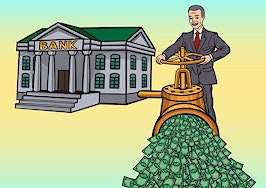At the end of a strange week with lots of fresh data, two things stand out: Mortgage and long-term rates stayed low, and market movements were magnified by mass escape from wrong-side trades.
On the surface, the U.S. data is strong. September payrolls jumped 248,000 jobs, plus another 69,000 revised up from prior months. But the whole purpose of a job is to make money. Average hourly earnings … uh … er … fell one cent to $24.53, up just 2 percent year over year before inflation.
The Fed’s job is to lean against too-rapid job growth, because in all modern economic cycles employers began to compete for employees by paying higher wages, ultimately producing inflation. The optimists are out of their minds today, cheering the health of the economy, but the income/unemployment disconnect is without precedent — although it does connect to a different view of the world.
Lou Barnes explains why slow wage growth can make renting look like a better deal than owning a home.
We are in a global deflation event, with which no one alive has or can have experience. Even those as old as me (65) have lived entire economic lives anticipating inflation, rarely high, usually moderate, and always present. Incomes have risen steadily, even if not so fast in real terms.
Moderate inflation has been an enormous benefit to disciplined households. Mortgage debt is in nominal dollars, the original balance and payment gradually but steadily shrinking. Avoid buying things whose prices inflate (which varies cycle to cycle), and beat inflation.
The U.S. is in better shape — vastly better shape — than any other major nation with the exception of the U.K. However, the absence of income growth, inflated or otherwise, is a telltale. One alternate explanation for a quarter of a million new jobs monthly and no wage growth: The unemployed and partially employed are taking jobs at poorer wages than old jobs, or — just as important for the youth set — poorer than expected.
Consider math that Americans have never had to consider. If I bought a home any time after 1935, I could expect my debt-to-income ratio at the outset to fall every year thereafter. The payment would become a smaller fraction of my gross income even if I did not upgrade my career, thereby adding safety (above all), increasing disposable income aside from the house payment, and I had bought an appreciating asset.
Friends in the financial world don’t get it. They are of, by and for markets in which any demand/supply disequilibrium is blamed on price. Thus today, just as they misunderstood home prices falling way below “clearing prices” 2007-2011, they mistake last year’s home price rise as overdone and blame it for this year’s softening home sales. The alternate (real) universe: The bulk of last year’s home price rise (except in strong local economies, like mine) was due to a rebound in overly discounted prices, and now we are reverting to nonrecovery.
We might get a housing recovery going if we backed off Dodd-Frank and Consumer Financial Protection Bureau hysteria, but that’s not enough. Homebuyers are instinctively aware of this calculus: If my income is rising 2 percent per year, and I’ve got to pay 4.25 percent interest to buy a home that might not appreciate, maybe I’ll rent defensively even if rents are rising 5 percent, and beat that game by renting a lesser apartment? We need higher incomes and would have them were the world not holding us back.
Deflation. Italy downshifted its growth forecast from 0.8 percent to minus 0.3 percent, its wallpaper bonds (145 percent of GDP) rising to 2.32 percent. German 10-years pay 0.89 percent in a currency falling fast versus the buck. Japan 10s pay 0.521 percent; in its suicidal miracle, it has inflated the cost of goods, but incomes less so. France will cut 1.5 percent from public spending, budget deficit still 4.5 percent of GDP, growth forecast cut to 0.4 percent, national debt 95 percent of GDP. Europe-wide year-over-year CPI fell last month to 0.3 percent.
The fantastic, panicked devaluation of euro and yen (soon to be joined by the yuan) is a desperate attempt to halt deflation overseas, but it exports disinflation to us.
Oh, by the way: The top geopolitical risk is now Hong Kong. China cannot hide a Tiananmen there, but neither can it tolerate this mass revolt. Perhaps it will fizzle.
Lou Barnes is a mortgage broker based in Boulder, Colorado. He can be reached at lbarnes@pmglending.com.








